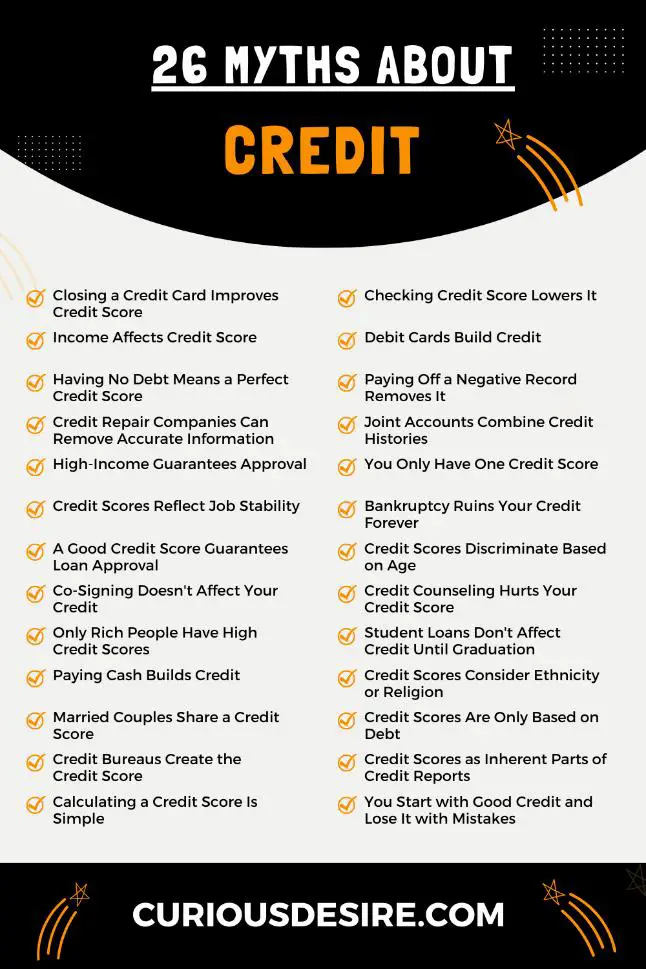There are lots of myths about credit that might not be true. These stories, or myths, can trick people into making money choices that are not so wise.
In this blog post, we’re going to uncover and explain some of these myths about credit.
Our goal is to help you understand what’s real and what’s not, so you can make smarter choices with your money.
Here are the 5 most common myths about credit:
- Checking Your Credit Score Lowers It
- Debit Cards Build Credit
- High-Income Guarantees Approval
- Bankruptcy Ruins Your Credit Forever
- Paying Cash Builds Credit
[toc]

Myth 1: Closing a Credit Card Improves Your Credit Score
Why the Myth Exists:
Some individuals believe that by reducing the number of open credit lines, they are perceived as less of a risk to lenders, thereby improving their creditworthiness.
Debunking the Myth:
Closing a credit card account can actually have a negative impact on your credit score. The credit utilization ratio, which is the amount of credit you’re currently using compared to your total available credit, plays a significant role in your score.
Closing a credit card reduces your available credit, potentially increasing your utilization ratio. This can signal to creditors that you are utilizing a higher percentage of your available credit, which may be viewed as a financial risk.
It’s essential to maintain a healthy mix of open credit accounts and manage credit responsibly to positively impact your credit score.
Myth 2: Checking Your Credit Score Lowers It
Why the Myth Exists:
This misconception might arise from the association between credit inquiries, especially “hard inquiries” from lenders during loan applications, and potential negative impacts on the credit score.
Debunking the Myth:
Checking your own credit score is considered a “soft inquiry” or “soft pull,” and it has no impact on your credit score.
Soft inquiries are initiated by the individual for personal reasons, such as monitoring their financial health. On the other hand, “hard inquiries” made by lenders during credit applications can have a minor and temporary impact on your score.
Regularly monitoring your credit score is a responsible financial habit and does not harm your creditworthiness.
It enables you to stay informed about your financial standing and address any potential issues promptly.
Myth 3: Income Affects Your Credit Score
Why the Myth Exists:
People might confuse credit scores with the debt-to-income ratio, which is a measure of how much of your income goes toward paying off debts.
While this ratio is important for loan approval, it is not a component of credit scores.
Debunking the Myth:
Credit scores are calculated based on your credit history, payment behavior, credit utilization, length of credit history, and other financial factors.
While a stable income is crucial for managing debt and maintaining good financial health, it is not a direct factor in determining your credit score. Lenders are more interested in your ability to manage credit responsibly and make timely payments.
Understanding the components that contribute to your credit score can help you focus on building a positive credit history without relying on income as a determining factor.
Myth 4: Debit Cards Build Credit
Why the Myth Exists:
There might be gaps in financial education, and some individuals may not fully understand the distinctions between credit and debit cards.
Debit cards and credit cards can be used in similar ways for everyday transactions. People may assume that if they are responsible for their debit card spending, it reflects positively on their credit.
Debunking the Myth:
Debit card usage does not contribute to your credit score. Unlike credit cards, which involve borrowing money that needs to be repaid, debit cards are tied directly to your bank account, and transactions with them do not influence your credit history.
To build or improve your credit score, it’s essential to use credit responsibly, such as making timely payments on credit cards or loans.
Understanding the distinction between debit and credit transactions is crucial for making informed financial decisions and managing credit effectively.
Myth 5: Having No Debt Means a Perfect Credit Score
Why the Myth Exists:
Some individuals believe that maintaining a debt-free lifestyle automatically results in a perfect credit score.
This false belief may arise from the assumption that debt is inherently negative and that eliminating it guarantees a flawless credit history.
Debunking the Myth:
While being debt-free is undoubtedly a positive financial situation, having no debt does not necessarily translate to a perfect credit score.
Credit scores consider various factors, including the types of credit accounts you have, the length of your credit history, and your payment behavior.
A diverse credit mix and a history of responsible credit use contribute to a higher credit score.
Striving for a balance between responsible credit management and financial stability is key to achieving and maintaining a positive credit score.

Credit Myths FAQs
1. What is the paradox of credit?
The paradox of credit is the idea that, to build a positive credit history, responsible credit use is necessary.
However, using credit irresponsibly can lead to accumulating debt, creating a challenging situation.
2. Why is credit a trap?
Credit can become a trap when misused, leading to borrowing beyond one’s means.
High-interest rates and fees can accumulate, fostering a cycle of debt that can be difficult to break free from.
3. What is a history of bad credit?
A history of bad credit involves consistently failing to meet credit obligations, such as late payments or defaults.
These negative actions are recorded in the credit report, making it challenging to qualify for loans or obtain favorable interest rates.
4. What is the secret to credit?
The secret to good credit lies in practicing responsible financial behavior. This includes paying bills on time, using credit wisely, and effectively managing debt.
5. What are the 5 keys of credit?
- Paying bills on time
- Using credit wisely
- Keeping credit card balances low
- Regularly checking your credit report
- Avoiding opening too many new credit accounts at once
6. What is the 15 3 credit hack?
The term “15/3 credit hack” is not widely recognized. It’s essential to be cautious of supposed credit hacks and focus on established principles of responsible credit management.
7. How to get a 0 credit score?
Achieving a 0 credit score is not a common goal, as it signifies having no credit history. To establish credit, consider starting with a secured credit card or a credit-builder loan.
8. How to get a 100% credit score?
Credit scores are not represented as percentages. Aim for a high numeric credit score by practicing responsible financial habits.
9. Who can carry a black card?
Black cards, often associated with luxury, are typically invitation-only and offered to individuals with high income and an excellent credit history. Examples include the American Express Centurion Card.
10. What is a perfect credit score?
A perfect credit score is usually considered to be 850, although it’s exceptionally rare. Having a score in the high 700s or 800s is generally considered excellent.
11. How can I get credit fast?
Building credit takes time, but you can start by obtaining a secured credit card, becoming an authorized user on someone else’s credit card, or applying for a credit-builder loan.
12. How to get a perfect credit score?
To improve your credit, focus on the 5 keys of credit, including paying bills on time, reducing credit card balances, and managing credit responsibly.
13. How to get 999 credits?
As mentioned earlier, credit scores typically max out at 850. Aim for a high score by practicing good financial habits over time.
